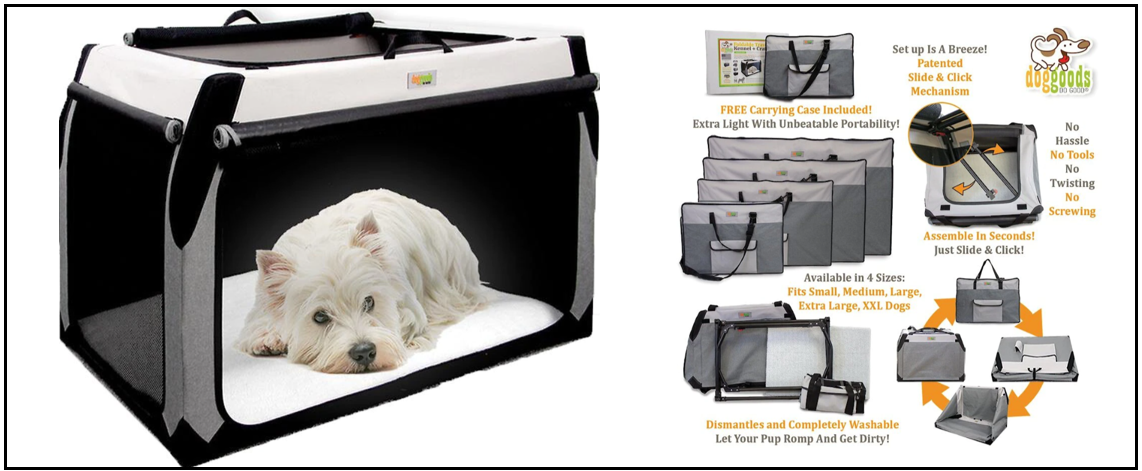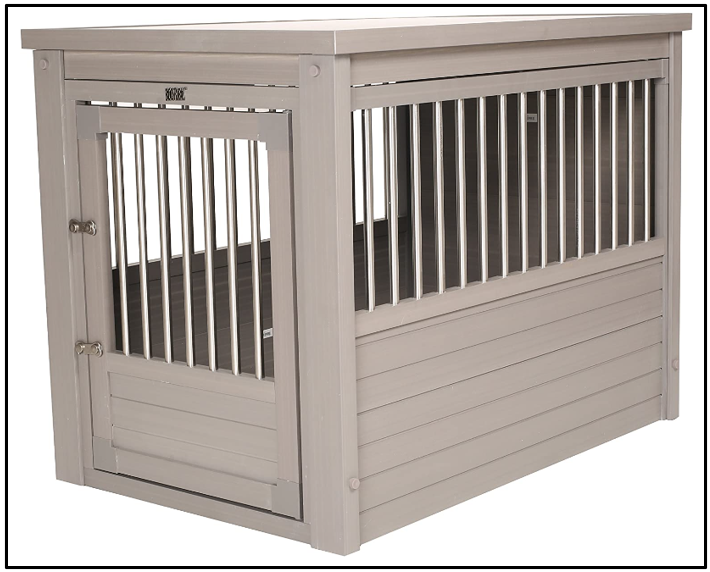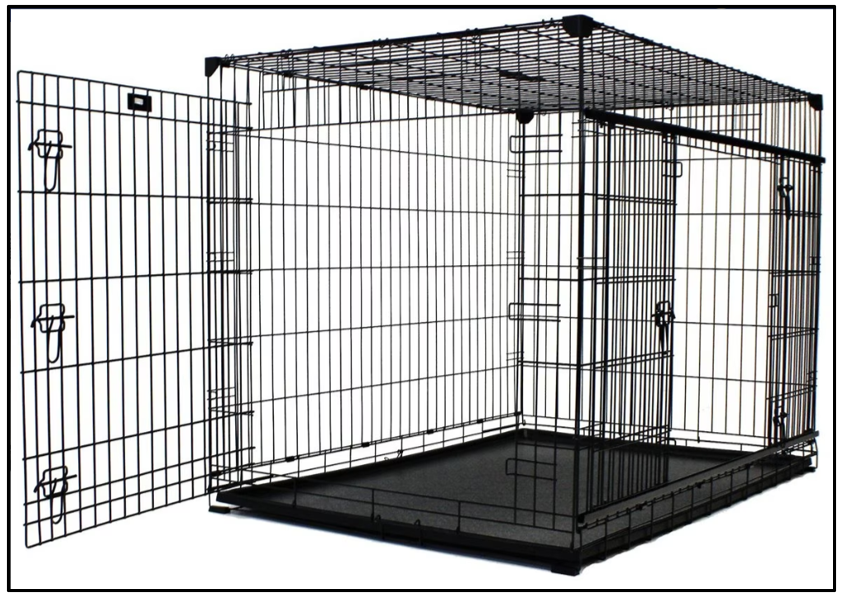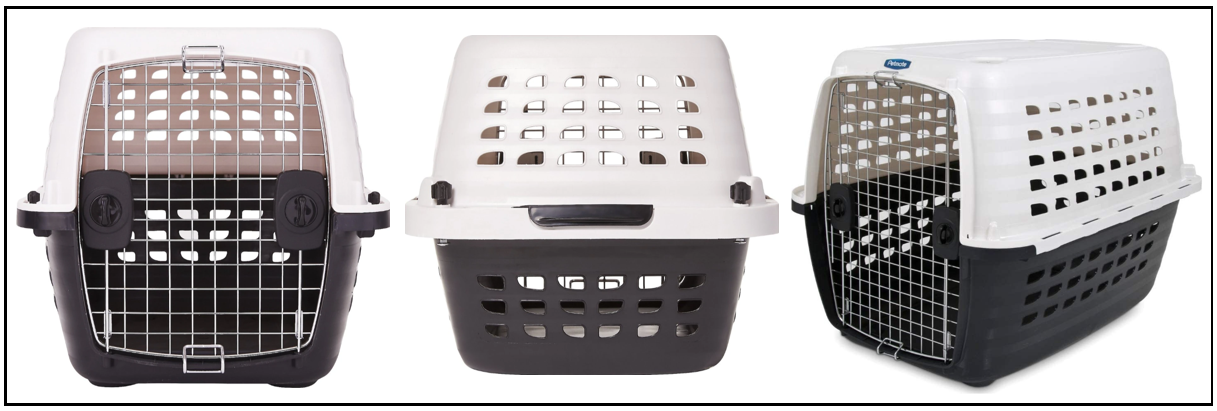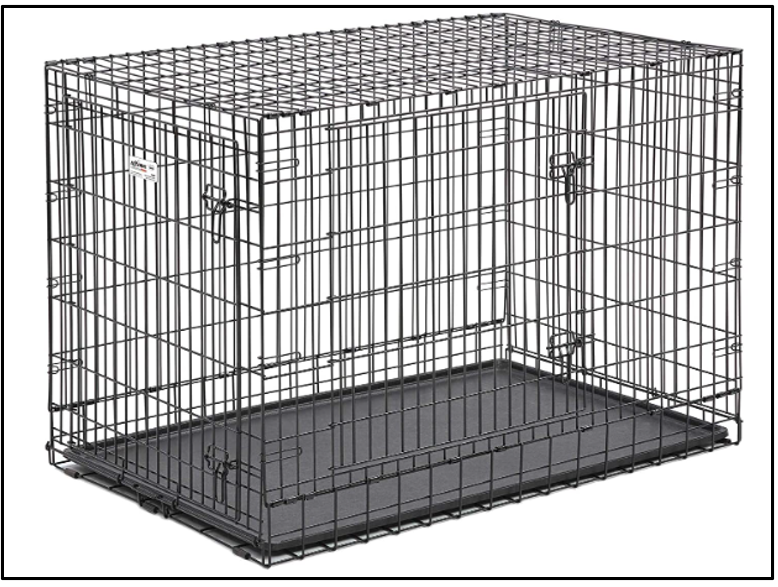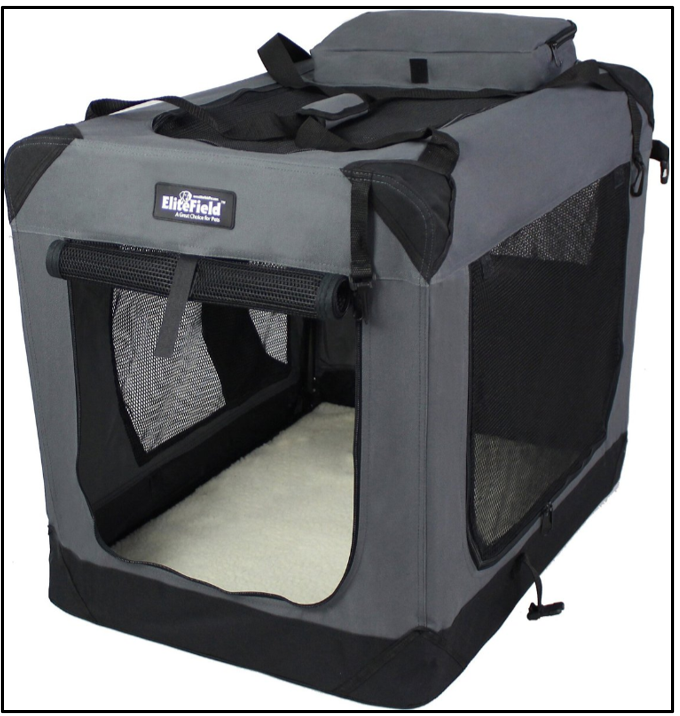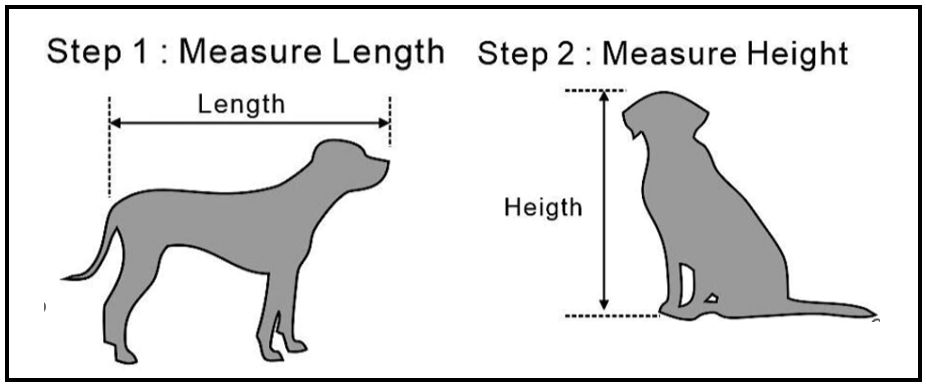Are you trying to find the best dog crate for your Japanese Chin?
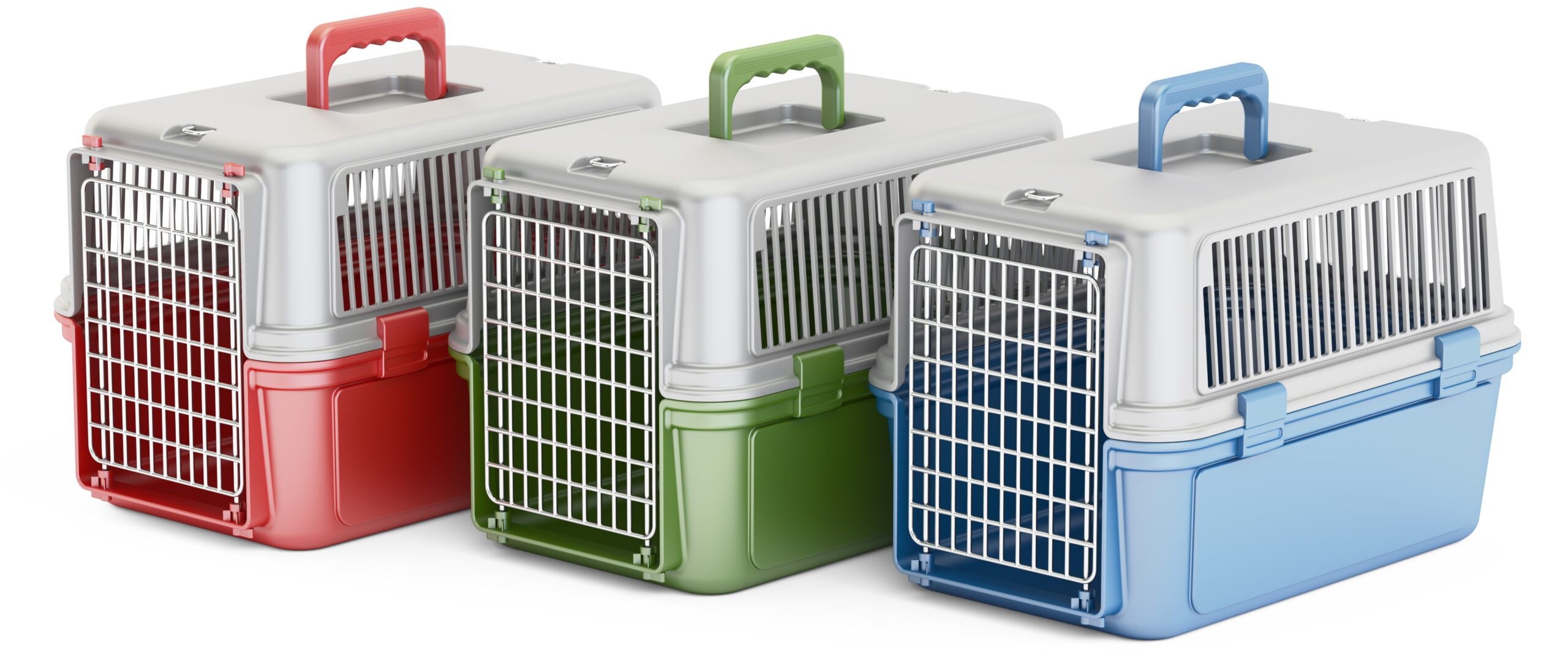
Crates are important because they give your dog a place to feel safe and secure. Whether you’re leaving the house, sleeping at night, or just spending time at home, every dog can benefit from having their own relaxing spot.
However, it can be hard to choose a style. For example, should you get a metal or plastic crate? Or would your dog prefer a soft-sided one? Or maybe you want a furniture-style crate that blends in with your home decor.
Just a quick note on this article: you might call the products below kennels, carriers, or cages, and those would all be accurate terms! I wanted to choose the name I thought worked best for all these items, so I’m calling them crates here. Whatever you call these products, I hope you can find one that works great for you!
7 Best Crates for Japanese Chins:
#1. Unipaws End Table Dog Crate
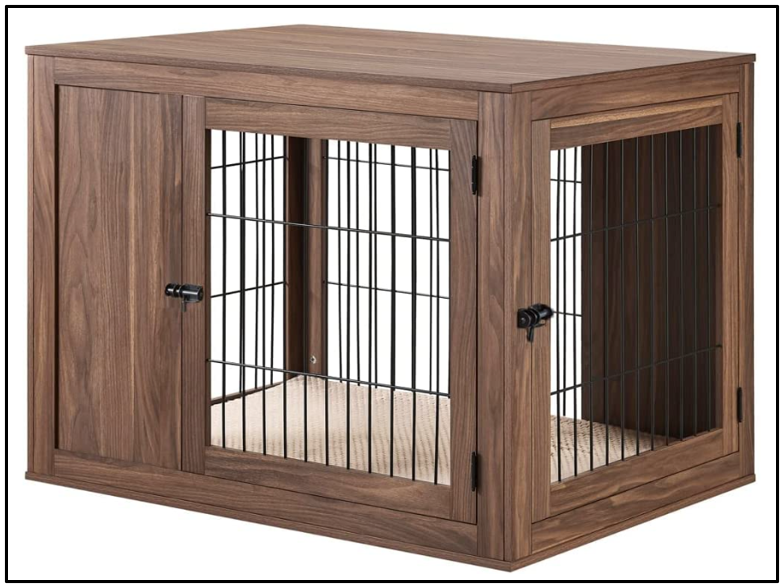
COMPARE PRICES!
The Unipaws End Table Crate is the perfect crate for Japanese Chins that are already trained and love their own space. It acts as furniture in your home, with a sturdy and beautiful design that will fit into almost any room.
The crate has two doors which is nice, so you can face either the long or short side out. It holds up to 200 lbs on the top safely, so you can easily use it as an end table.
Although this dog crate looks awesome, it isn’t designed for determined escape artists! It only has a single sliding lock, so dogs that want to get out will likely be able to push open the door.
However, if your dog loves to be in a crate (like most crate-trained pups), this is a perfect option for you!
Positives:
- The wood finish and furniture-like design mean you don’t have to sacrifice style to keep your dog crated.
- There are two doors, allowing flexibility in where you place the crate.
- You can use the top of the crate as an end table.
Negatives:
- The doors only have one sliding lock, so determined dogs won’t have much trouble getting out.
- This dog crate is heavier than most because it’s made of wood instead of wire or plastic.
#2. DogGoods Soft Crate
COMPARE PRICES!
This soft dog crate for Japanese Chins is one of the most innovative I’ve seen!
The DogGoods Soft Crate comes with its own carrying case and collapses into a flat, lightweight package. It’s easy to take on trips, whether you’re traveling by plane, car, or even going camping. For small dogs, you can even use this crate as a carrier on planes.
The extra light design is perfect for use on the go. Plus, your dog will love the breathable mesh sides and plush base. It features an iron frame, so you don’t have to worry about the sturdiness of the design.
However, like other soft-sided crates, this one is best for crate-trained dogs with an easygoing temperament. The mesh sides would be easy for a determined dog to get through!
Positives:
- The collapsible design and carrying case make this crate perfect for travel.
- With thick fabric and iron framing, you don’t have to worry about durability.
Negatives:
- Escape artists and pups who aren’t crate-trained will get out with no problem.
- Expensive – this dog crate is pricey, especially for a soft-sided option.
#3. New Age Pet EcoFlex End Table Crate
COMPARE PRICES!
If you love the idea of a furniture-style crate but are on a budget, look at the New Age Pet ExoFlex End Table Crate. This stylish table with a built-in crate for Japanese Chins won’t disappoint!
It comes in a variety of finishes, and the slatted wood design works well with any style. Your dog will be able to see out of the windows but still feel secure in the cave-like crate.
Another benefit of the ExoFlex End Table Crate is the materials used to manufacture it. It’s made from recycled plastic and reclaimed wood and is made to be non-toxic and moisture-resistant.
The Large & Extra Large crates also have an additional latch on the door to help keep bigger dogs contained.
Positives:
- Price – this is one of the lower-priced furniture-style crates available, but it doesn’t skimp on quality.
- The high-quality materials are non-toxic, water-resistant, and safe for any dog.
- New Age Pet also offers high-quality matching accessories like this elevated feeding station.
Negatives:
- Although this crate is sturdy, many determined dogs can still escape. Therefore, it’s best for pups who are already crate trained.
- This dog crate’s “wood” parts are a plastic and wood composite, which may be disappointing to some unsuspecting customers.
#4. Lucky Dog Sliding Door Crate
The Lucky Dog Sliding Door Crate is perfect for any Japanese Chin, whether they’re being crate trained or already have been. This wire crate with a plastic removable tray floor has corner stabilizers to keep it steady and prevent rattling. The tray comes out for easy cleaning and can be covered with a dog bed or blanket for extra comfort.
One of my favorite things about this metal crate is the two choices of doors. One side has a sliding door, which is perfect if you don’t have enough space for a swinging door. The other side has a traditional door that opens outward.
The wire construction is breathable and gives your dog plenty of opportunities to see out. But if they prefer a little more enclosed space, you can always throw a blanket or towel over the top to give them privacy.
Positives:
- The sturdy wire construction and leak-proof removable tray floor are perfect for most dogs.
- This is a fantastic crate to use for training your dog or puppy.
Negatives:
- Some dogs may be able to open the sliding door or push open the swinging door, even with a lock.
#5. Petmate Compass Plastic Crate
COMPARE PRICES!
The Petmate Compass is a hard-sided plastic crate for Japanese Chins.
This sturdy, easy-to-clean crate is perfect for use at home or for car travel. In some cases, they can even be used for air travel if you fly with your dog.
It has a large doorway with a metal door and plenty of ventilation holes to ensure your dog stays comfortable and happy inside. Plus, it’s easy to assemble, and the door opens quickly.
One thing to remember before purchasing this crate is that it can be hard for some dogs to use because there isn’t as much visibility from inside. Especially if they’re used to a standard wire crate, the transition to a plastic crate may take some time.
Positives:
- This crate is made of heavy-duty and durable plastic, easy to clean, and easy to assemble.
- It meets most airline regulations, so you can use this crate if you fly with your pet.
Negatives:
- Some dogs have trouble transitioning from a wire crate to a plastic one.
#6. Midwest Ultima Pro Wire Crate
COMPARE PRICES!
The Midwest Ultima Pro Wire Crate is a fantastic choice for Japanese Chins.
This versatile metal crate has a swing-open door and a double latch, so it’s sturdy and easy to use. It also features a leak-proof floor pan that’s easy to remove and clean. Best of all, this crate is collapsible, so it can easily be moved or relocated.
As with any crate, it’s important to train your dog to use it so they can be comfortable inside. If your dog is fearful and determined to escape, they will likely find a way out!
If you need tips on how to crate-train your dog, this is a good video that outlines the basics.
Positives:
- This crate is easy to use and has convenient features like a collapsible design, a leak-proof tray floor, and a double latch door.
- Price – despite being heavy-duty, durable, and well-made, this crate isn’t as expensive as other options.
Negatives:
- Like any crate, this one will require training so your dog or puppy can feel comfortable and secure inside. So make sure you can devote the time to teaching your dog how to use it.
#7. Elite Field 3-Door Crate
COMPARE PRICES!
If you and your pet love traveling together, the Elite Field 3-Door Crate is perfect! This soft-sided crate is collapsible and lightweight, so you can take it anywhere, and the steel tubing frame means it will stand up to all your adventures.
It’s best to use a soft-sided crate for Japanese Chins that are already crate trained.
This is because they’re much easier to escape from, so you want your dog to be comfortable enough that he won’t try to get out.
The Elite Field 3-Door Crate is an awesome choice because of the three mesh sides that allow for airflow and visibility. Additionally, this crate comes with a comfortable pad that your dog will love relaxing on! The best feature, in my opinion, is that the crate folds down and has a built-in carrying handle to give you ultimate portability.
Positives:
- This crate is collapsible and portable, so you can take it anywhere!
- The three-door design and mesh walls allow for plenty of ventilation.
Negatives:
- Most dogs can escape if they want to because this soft-sided crate is made mostly of fabric.
Why are crates good for Japanese Chins?
- Pet Safety: dogs are like children; they’re naturally curious and want to explore their surroundings. Often, this means dogs will accidentally get into things that aren’t meant for them, which can be dangerous. To keep your dog away from potentially harmful things like trash, medications, or breakable furniture, keep them crated when you’re gone.
- Well-being: many pups suffer from separation anxiety or nervousness, and studies show that crate training and a comfortable crate environment can help with these negative feelings.
- Peace of mind: You’ll be able to leave the house with the knowledge that your dog is safe, secure, and happy in their own space without worrying about puppy-proofing!
How to choose the right size of crate for your Japanese Chin:
In addition to the below advice, you should always follow the manufacturer’s sizing recommendations.
- First, measure your dog from nose to rump while they’re standing. This will give you an accurate length.
- Then, measure their height from head to floor while sitting for an accurate height.
- Finally, add four inches to both the length and height, and these will be the approximate dimensions you should look for in a crate.
It’s important to make sure your dog has enough room, or else they won’t want to be in their crate, but you also don’t want too large a crate because dogs usually prefer just a little space. So you should add four inches to their length and height and choose a crate that’s approximately those dimensions.
Where should I put my dog’s crate?
The answer to this question depends largely on your dog’s personality. But the best thing to do is think about your dog’s comfort when you decide where to put their crate. For example:
- Place your dog’s crate in an area where you spend lots of time.
- This usually means a family or living room.
- Puppies usually do better with a crate in your bedroom at first since they need frequent potty breaks.
- Some dogs with anxiety may prefer a quiet, low-traffic area instead.
- Avoid areas that will get excessively warm, like nearby radiators or heating vents, fireplaces, or areas with direct sunlight.
- Avoid drafty windows or doors that might get too cold.
RELATED ARTICLES:
What crate do you use for your Japanese Chin?
Let us know in the comments!


